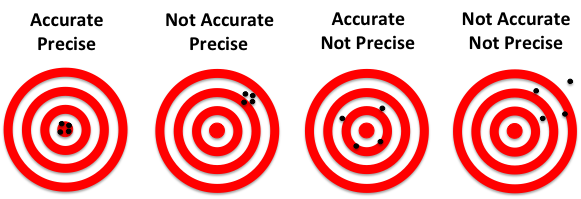What is precision?
1 Answer
Precision is a way of measuring the closeness of a set of answers to the others presented by the experimenter; that is, it is a measure of consistency or reproducibility.
Explanation:
Throughout chemistry there's a big difference between two large terms. Accuracy vs Precision. There's also a big difference between them.
Let's start with accuracy. Let's say the accepted answer to a problem is 1. Here's the accurate dataset of answers that your class got.
As you can see, most answers are very close to 1.
An accurate answer is very close to the accepted result. If the accepted answer is 4 and you got 3.9 while everyone else got 0, your answer is the most accurate.
Now, what about precise? Let's take a look at a data set. The accepted answer will be 1 again.
As you can see, none of these answers are remotely close to 1. However, they are all very precise to each other.
A precise answer is very close to the other answers, but not necessarily close to the accepted answer. If the accepted result is 5 and you got 200, your answer is precise if the rest of the class gets answers close to 200.
Here's an infographic that helps explain.



